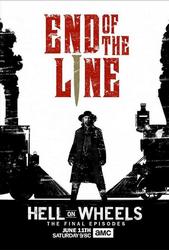Hell on Wheels Episode 1.01 Pilot
- Anson Mount as Cullen Bohannan
- Common as Elam Ferguson
- Colm Meaney
- Christopher Heyerdahl as The Swede
- Jennifer Ferrin
- Robin McLeavy
- Ben Esler
- Philip Burke
- Kasha Kropinski
- Dohn Norwood
- Reg Rogers
- Tzi Ma
- Eddie Spears
- Tom Noonan
It's 1865. A Union soldier enters a Catholic church to confess the "evil, unspeakable" acts he committed during the Civil War. "Tell me about Meridian," the priest asks before shooting the Yankee dead. The "priest" is actually Cullen Bohannon, a former Confederate soldier.
In a plush drawing room, Thomas "Doc" Durant pitches the Union Pacific Railroad to well-heeled investors, inspiring their applause when he compares his "mad, noble quest" -- building the transcontinental railroad -- to the pyramids of Egypt and the Great Wall of China.
"It's all horse crap," Durant admits to U.S. senator Jordan Crane before offering a bribe: shares in Crédit Mobilier, the company Durant established to siphon off government railroad subsidies. "So you'll be paying yourself to build a railroad," observes Crane. Citing an upcoming Senate vote, Crane angles for more shares. Durant responds by threatening to reroute the railroad to bypass Crane's Nebraska landholdings and reduce the senator's kickback.
On a train heading west, Cullen encounters two Irish-immigrant brothers, Mickey and Sean McGinnes, who are reading an account of the church murder. When the talk turns to belief in God, Cullen identifies his pistol as his higher power. Cullen, like the brothers, hopes to find work on the railroad.
In Iowa, Daniel Johnson, the railroad foreman, pegs Cullen as a "Johnny Reb" because of his Griswold pistol. (A Confederate soldier had blasted off Johnson's hand with one.) Johnson hires Cullen to supervise an all-black "cut" crew preparing the terrain for tracklaying. As a former slave master, Johnson tells the freedmen, Cullen will see through their tricks. “Some things don't never change,” mutters Elam Ferguson, one of the freedmen on the crew.
Nearby, Reverend Nathaniel Cole baptizes Joseph Black Moon, a Cheyenne Indian, in the Missouri River. The two later arrive at Hell on Wheels, the roving tent city that accompanies the railroad's western expansion. Cole observes the assembled prostitutes and drunkards and instructs Joseph to raise the church tent next to them. "We do our own share of converting around here," a prostitute warns.
As his Pullman car heads west, Durant fires his chief engineer for building the railroad in a straight line, depriving Durant, who gets paid by the mile, the extra government cash a meandering route would generate.
Farther west, in Nebraska, Lily Bell reads poetry while Robert, her husband, maps the landscape for the Union Pacific. Coughing intermittently, Robert reminds Lily that she agreed to return to Chicago before they entered hostile Cheyenne territory. Lily refuses to leave while he's sick.
That evening at Hell on Wheels, Cullen plays cards with Johnson and two others at the Starlight Saloon. Cullen reveals that to please his northern-born wife, who's now dead, he freed his slaves before the war. "Did the war take her?" asks Johnson. "Something like that," Cullen replies.
The next morning, Cheyenne Indians attack the surveyor's camp. Robert and Lily escape with his maps into the woods, but Robert's cough gives them away, and a Cheyenne brave shoots Lily with an arrow. To defend Robert, Lily yanks out the arrow and pierces the brave's throat with it. The Indian dies, as does Robert. After kissing her husband farewell, Lily flees with the maps.
The cut crew labors under the hot sun, exhorted by Cullen, who silently nods his acknowledgment when Elam motivates the men with a chant.
Still in his Pullman, Durant receives a telegraph informing him about the Cheyenne attack. Concerned about the maps, Durant reroutes to Hell on Wheels.
When heat overtakes William, one of the freedmen, Elam escorts him to the water barrel. Cullen ignores this infraction, but Johnson rides over, irate that William is taking a break. Johnson's horse, frightened by a dynamite explosion, kicks William in the face.
That evening, William lies deceased in Elam's tent. Cullen watches Elam sharpen a knife and warns him not to murder Johnson. Holding a yellowed newspaper clipping announcing the Emancipation Proclamation, Elam mocks William for thinking the world would change. Cullen advises Elam to let go of the past. "Have you let it go?" asks Elam.
Cullen pays to see Mickey and Sean's magic-lantern show and watches Irishmen sob as Sean projects images of Ireland while Mickey croons in Gaelic. "Do you not pine for your own homeland?" Sean asks Cullen. "It's gone," Cullen replies.
Still later, Cullen drinks with Johnson, who waxes about his war experiences and facing down death. Cullen pours shots but tosses his own under the table. Drunk, Johnson admits to crossing moral lines but dismisses it as what men do in war. "Moral men don't," argues Cullen, who asks if Johnson was ever in Meridian, Mississippi. His good hand under the table, Johnson points his pistol at Cullen.
Johnson marches Cullen outside at gunpoint and accuses him of murdering the Union soldier and two other men. "I wasn't proud of what happened to your wife," says Johnson, confessing that he witnessed a sergeant strangle Cullen's wife, then make it appear like a suicide. "He's out here, too," says Johnson. Cullen asks the man's name, but as he does Elam slips behind Johnson and slashes his throat. Johnson dies without revealing the sergeant's identity.
In the Pullman, Durant drunkenly expounds to an unseen audience on building the railroad, describing it as a brutal affair that rewards the lion for his ferocity. The zebra is eaten, as he should be. While Durant speaks, we see Cullen supervising his crew, wolves rummaging through carnage on the surveyor's camp, and Lily running desperately with the maps.
In a hundred years, America will be a great empire, Durant says aloud to himself, yet he'll be remembered only for his greed. Nevertheless, he continues, "without me or men like me, your glorious railroad would never be built."









